Nazi collaborator monuments in Latvia
Various memorials have been erected to honor the Latvian Legion, a formation in the Waffen-SS

Left: Latvian SS volunteers parade, Riga, December 2, 1943 (Bundesarchiv, Bild 183-J16133 via Wikimedia Commons). Right: veterans of the Latvian Legion during Remembrance Day of the Latvian Legionnaires march, Riga, March 16, 2019 (Ilmars Znotins/AFP via Getty Images). Image by Forward collage
This list is part of an ongoing investigative project the Forward first published in January 2021 documenting hundreds of monuments around the world to people involved in the Holocaust. We are continuing to update each country’s list; if you know of any not included here, or of statues that have been removed or streets renamed, please email [email protected], subject line: Nazi monument project.
Bauska — The Monument to the Defenders of Bauska (below left, unveiled in 2012) honors the Latvian Legion, a formation in the Waffen-SS, the military wing of the Nazi party responsible for, among other crimes, the Holocaust. The Latvian Legion was composed of two SS divisions: the 15th (1st Latvian) and 19th (2nd Latvian).
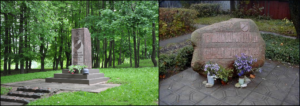
The obelisk contains the quote “Latvia must be a Latvian state” by Kārlis Ulmanis, the dictator who ruled the country until 1940. Ulmanis championed turning Latvia into an ethnically Latvian nation; his dictatorship oppressed Jewish media and pushed Jews and other minorities out of public and economic life. Above right, a second SS memorial in Bauska. (Many thanks to Kevin Prenger and Kaj Metz of Traces of War for guidance and images of Bauska, Pienava and Sāti memorials.)
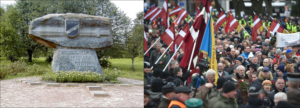
More — A memorial commemorating the Latvian Legion, which participated in the Battle of More in September 1944. In 2019, the Latvian defense minister delivered a speech on the site, praising the Waffen-SS legion as the “pride of the Latvian nation.” See guide brochure, Defending History’s coverage and the Simon Wiesenthal Center’s condemnation.
Above right, Latvian Legion SS veterans march through Riga, March 16, 2016. (Thanks to Defending History contributor Aleksandr Kuzmin for information about this and other Latvian memorials.)
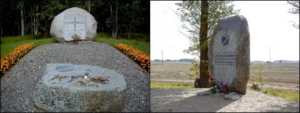
Pienava — Two of several monuments to the Latvian Legion located in the area. About 70,000 (three quarters) of Latvia’s Jews were murdered during the Holocaust with the aid of Latvian collaborators.
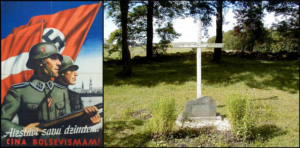
Sāti — A cross memorial to the fallen Latvian Legionnaires. Above left is a Latvian SS recruitment poster with SS insignia on the collar and on top of the legion’s insignia on the helmet.
Below left, the 15th Waffen Grenadier Division of the SS (one of the two units composing the Latvian Legion), marches in Riga, 1943. Below right, Latvian Legion SS veterans and relatives in a parade through Riga, 2019.
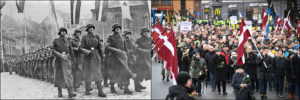
***
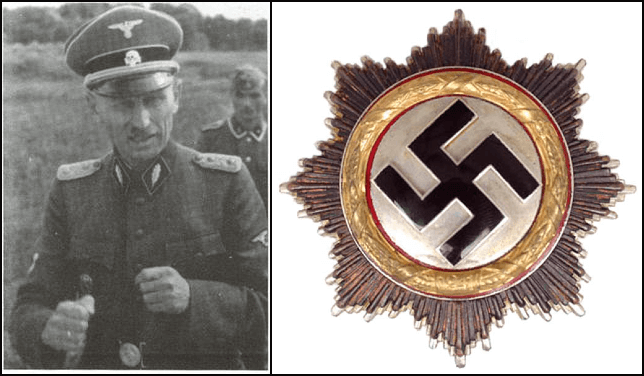
Ogre (entry added June 2025) – In 2022, the town renamed a street in honor of Vilis Janums (1894–1981), Waffen-Standartenführer (a rank equivalent to colonel) in the Latvian Legion. A decorated officer, Janums had received the Iron Cross, 2nd Class, Iron Cross, 1st Class and German Cross in Gold (above right) Third Reich military awards. See coverage in TV3 Latvia (Google translation here).
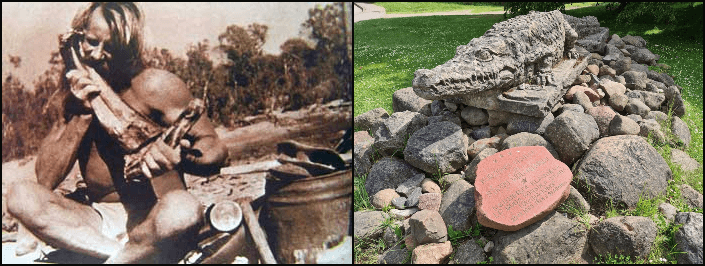
Dundaga (entry added June 2025) – A strange monument celebrating Arvīds Blūmentāls aka “Crocodile Harry” (1925–2006). Blūmentāls served in two Nazi-controlled formations: the 25th Schutzmannschaft Battalion (these auxiliary police units were under the Ordnungspolizei, which was controlled by the SS – they had committed numerous war crimes) and later in the Latvian Legion. After the war, Blūmentāls, like many collaborators, escaped to Australia where he reinvented himself as “Crocodile Harry,” an infamous crocodile hunter featured in numerous news stories. The Dundaga monument capitalizes on that legend, as does a permanent exhibit to Blūmentāls in nearby Dundaga Castle. For more, see article in the Awl. See the Australia section for another monument to Blūmentāls.
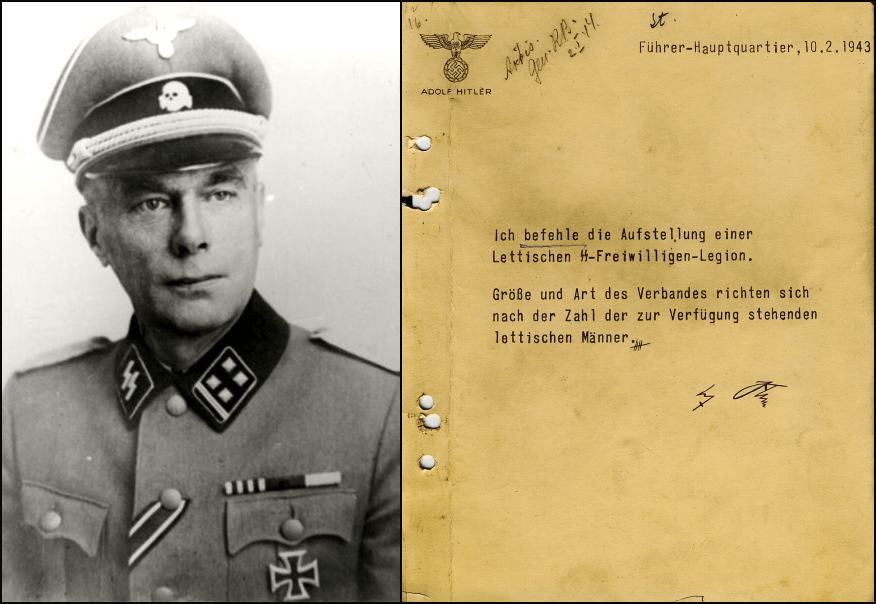
Līdumnieki Parish (entry added June 2025) – Near the bank of the Zilupe River stand memorials to Latvian Legionnaires who died nearby and to their commander, Kārlis Aperāts (1891–1944). A Waffen-Obersturmbannführer (a rank equivalent to lieutenant colonel), Aperāts was decorated with the Iron Cross, 1st Class and Iron Cross, 2nd Class and posthumously awarded the Knight’s Cross of the Iron Cross, Nazi Germany’s highest military honor. A memorial cross in honor of the legionnaires was put up in 1994; a memorial stone to Aperāts was erected next to the cross around 2003. See here for a photo (Google translation here). Above right, Hitler’s authorization for the creation of the Latvian Legion, February 10, 1943.
For a monument to the Latvian SS outside of Latvia, see the Belgium section.
For more on Latvia’s parades to actual SS soldiers see reports in JTA, the Jerusalem Post and Haaretz as well as Defending History’s Latvia page.





















